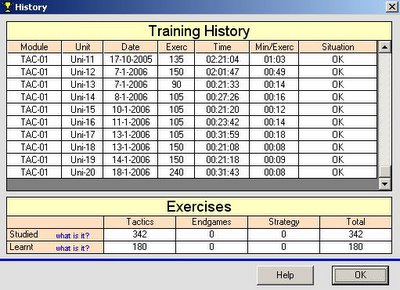And Then There Was Chess...
Thursday, January 19, 2006
Sunday, January 15, 2006
Andrew Martin and The Basics of Winning Chess The Opening 4. The right way to learn a new opening and a summary of opening principles
I've been watching the 4th and final chapter on the opening tips, and in this chapter International Master Andrew Martin discusses the right way to learn a new opening and makes a summary of all the previous opening principles. The first thing he advocates is experimentation. There's no harm in trying a variety of openings. Eventually you will arive at the right choices for you. The best way to prepare is to use the following method; The first stage is the familiarization phase. He recommends playing through a number of games in your favourite opening, say 20 or 30 games or so. To get the basic ideas in your head. At this stage ignore detail an play through the games at a reasonable pace but not too slow. The second stage after the familiarization phase, is to try the opening out in friendly games. Either on the Internet, at your club or against a strong playing program. Just to see how it works. The third stage is to check out your knowledge that you've learned now, against the theory in the opening books. Notice only after a playing phase and a familiarization phase are you coming to the opening books. This is the stage at which you need to study some theory. people make the mistake of studying theory far to often (in Mr. Martin's opinion), without trying out the openings themselves for quite a few times. Then repeat stages two and three for a few weeks. Keep trying the opening out in friendly games at your club, the Internet, against your program, and keep studying the theory. Finally, you then come to play your opening in competitive chess. You should have a very good knowledge of the opening at this stage. Having played it and studied it for some time. And finally, don't forget to analyze your games thereafter. This is probably the most important stage of all of the whole process. A lot of players leave out this phase cause they're simply too lazy. If you done all the study, done all the work, and you analyze your games after again using all the tools mentioned, you cant go wrong. You can continuesly update your opening knowledge this way. This is how the best players do it... This is how you should do it. Follow this advice and you won't go far wrong.
Now we come to a final summary of all the opening principles of this part of the DVD. If you stick to and master the following principles of opening play, you will not go far wrong. Point number one is a fairly simple one, bring all the pieces out into play as quickly as possible. In general the pieces should be developed in reverse order of strength, but that's not an absolute. Knights and Bishops first, Rooks, Queens. Something like that. Only make a few pawn moves in the opening. Don´t go freaking out untill you´ve mastered the basics. Only make those pawn moves that are necesarry to let the pieces out. This is very important. The third point is to castle early to get your King to safety and to bring your Rooks into the game. Think Rooks. They are very important pieces. A lot of beginning players neglect their Rooks when they´re starting out in chess. Think about your Rooks and use them. Don´t lose time by bringing your pieces out to vulnarable squares where they can get chased around. Try not to move the same piece too many times. Play to occupy or control the center. This gives you more choices of plans for the middlegame. And finally remember that the whole idea of the opening is to get a good position going into the moddlegame. No more, no less.
Note that i´ve been writing this down while watching the video itself. So it is kind of roughly summarized )or whatever you call it).
I am moving on now to another part of the DVD that handles the middlegame.
Saturday, January 14, 2006
Finished unit 18 and 19
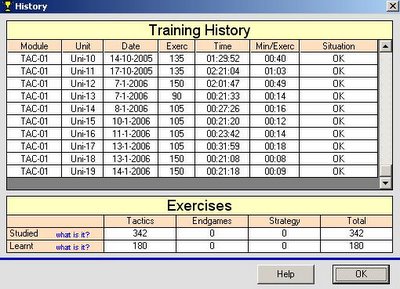
My back ache still isn't over and makes it hard for me to find a comfartable position to sit in. I did manage to finish unit 18 and 19 of tactics module 1 though. I must say that i really like the pace at which i'm going. Though i'm not fooling myself by thinking that this pace is going to last. Because the units i'm doing now, are just repetitions of previous positions with some of them being slightly altered. But they all come down to being the positions you've allready encountered. That is why i am going at a relatively fast pace right now. But i'm sure that within a couple of units i am going to be hit by something that will slow my current pace considerably.
Friday, January 13, 2006
Finished unit 17
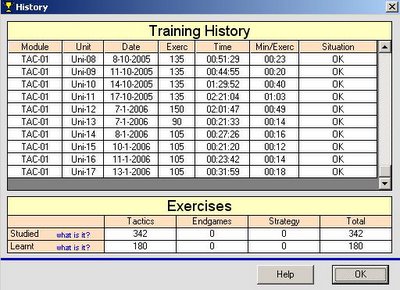
Finished unit 17 of tactics module 1, while recovering from a severe back ache and learned even more positions. I've learned 180 now. The best thing is that they actually feel learned :)
So now it's 17 units down and 35 to go. And that's only tactics module 1 i'm talking about here... There are 5 more of them. And each of them hold 52 units. And then ofcourse there are the strategy and endgame modules... Phew! Completing PCT is gonna be quite a task. I also got my hands on a Fritz Powerbook 2005. A must have (if i may say so myself) for people who want to prepare for tournaments and the variety of openings they might confront. Ofcourse you can prepare yourself and your game against Fritz with it's supplied opening book. But you are likely to face very one sided opening play. And that is why ChessBase created the Powerbook. Just click the link for extended info. And don't overlook the link to Steve Lopez's review, as he explains in detail what the benefits are of having a Powerbook.
Wednesday, January 11, 2006
Finished unit 16
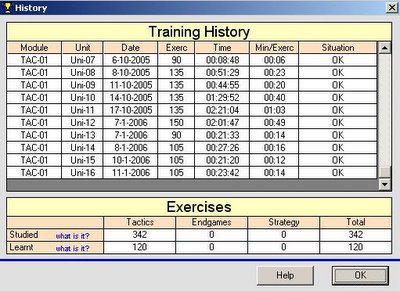
Finished unit 16 of tactics module 1, while being sick. Talk about commitment :)
According to PCT i've learned 120 positions now. Also been in touch with Mr. Bill Wall, and got this blog and my link collection listed amongst his... Seems there are quite a few other Knights listed there as well. Going to finish watching Man-Thing now, and get some sleep.
Tuesday, January 10, 2006
Finished unit 15
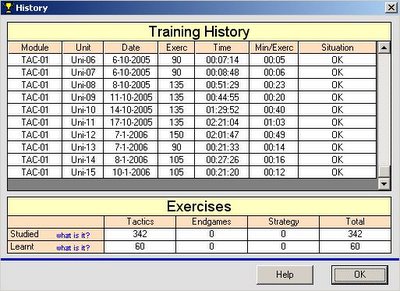
Finished unit 15 of tactics module 1. The program finally considers some positions as learned. 60 out of the 342 unique positions i've encountered to be exactly. Personally i wouldn't put too much value into PCT's considerations, and the reason for that is simple... PCT is designed in a way, that if it encounters one and the same position for six times throughout your training, it will consider it as having been learned. But it does not keep track of how many times, out of the six times you've encountered that position, you made the wrong choice... What i am really trying to say, is that you should only value it's considerations when stuff actually feels learned.
Anyway, i hope my posts make sense most of the times, cause what i am trying to explain in English, sits in my mind in Dutch. Now, i know that the Dutch way of saying what i am trying to say is correct. But to translate that to English, and try and make it look the same as it would be in Dutch is pretty hard to do :)
Monday, January 09, 2006
Andrew Martin and The Basics of Winning Chess The Opening 3. Choose the right opening for you!
I managed to watch the third chapter on opening tips as well :)
In this chapter, International Master Andrew Martin talks about choosing the right opening. He tells us that knowledge of yourself and your playing style is essential when it comes to choosing your openings. He also tells us that if you're starting out in chess, it is better to play open positions. To learn how to make combinations. To learn to attack. And to generally learn how to develop your pieces. Ofcourse, this is all done during the course of yet another game. This time we get to see a very famous game between Robert James Fischer and Boris Spassky. The game that's used in this case, is to show us that Fischer certainly knew what openings to choose.
Sunday, January 08, 2006
Andrew Martin and The Basics of Winning Chess The Opening 2.a + b)
I also got around to watching another part of the "Andrew Martin and The Basics of Winning Chess" DVD. I've watched the second chapter of the opening tips. It's about coordinating the pieces and aiming for the initiative. The game used as an example in this case, is a game between Mikhail Botvinnik and Viacheslav Ragozin. In which you should pay close attention to Botvinnik's play. In particular the coordination of Botvinnik's pieces with which he aims solely for the initiative through the entire game, and brings home the win.
Andrew Martin also notes that a study of the classics is essential if you want to become a good player.
Finished unit 13 and 14
Finished unit 13 and 14 of tactics module 1. Both in one breath! I'm on a roll here :)
Saturday, January 07, 2006
Finished unit 12
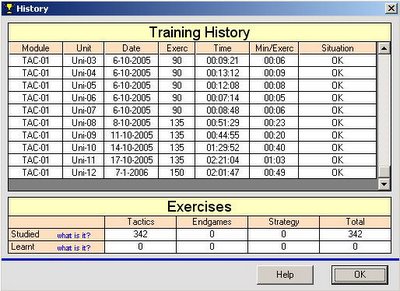
As you can see, i finished unit 12 of tactics module 1. Due to start on unit 13 tomorrow. As i mentioned earlier, i did like only a tactic a day for a couple of days. I just didn't get around to doing more. But hey! It's better to be doing a tactic a day then to be doing no tactics at all, right?
Anyway, I got around to doing more then one today :)
Friday, January 06, 2006
Internet chess statistics January 2006
An update on my stats is available! Check it out if you're interested. 13 out of 14 show positive scores. Sign's of improvement?
Thursday, January 05, 2006
A tactic a day keeps the (chess)doctor away?
Wauw!
It's allready January 5 and all i have done so far since continuing PCT where i left off, is about 3 positions.
Talk about a tactic a day :)
